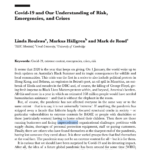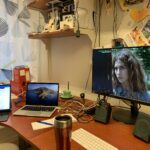Some thoughts about surviving the zombie apocalypse and a couple of leadership lessons that are taken from that. A conversation recorded between Jonathan McCrea and I, in the leading science radio program in Ireland: Newstalk.
On the research, writing & corporate services of Markus Hällgren
Some thoughts about surviving the zombie apocalypse and a couple of leadership lessons that are taken from that. A conversation recorded between Jonathan McCrea and I, in the leading science radio program in Ireland: Newstalk.
 Some time ago, Linda Rouleau, Mark De Rond, and I had our article.. published in Journal of Management Studies. Hopefully, researchers become interested in extreme contexts, or it helps to articulate some interesting aspects for researchers that are already interested in extreme contexts. You find the article here: https://onlinelibrary.wiley.com/doi/pdf/10.1111/joms.12649
Some time ago, Linda Rouleau, Mark De Rond, and I had our article.. published in Journal of Management Studies. Hopefully, researchers become interested in extreme contexts, or it helps to articulate some interesting aspects for researchers that are already interested in extreme contexts. You find the article here: https://onlinelibrary.wiley.com/doi/pdf/10.1111/joms.12649
 Leadership and team dynamics are obviously important to any project setting. In the books and articles, it is typically described as something inherently positive and not that entirely complex. By examining a clip from the Walking Dead Series, and problematizing the notion of leadership and teams we learn a great deal about human behavior, in project settings, or apocalypses. What great fun to discuss such matters with the students at the master’s program in management! The case itself is developed with and from research with Professor David Buchanan (Photo: teaching these days]
Leadership and team dynamics are obviously important to any project setting. In the books and articles, it is typically described as something inherently positive and not that entirely complex. By examining a clip from the Walking Dead Series, and problematizing the notion of leadership and teams we learn a great deal about human behavior, in project settings, or apocalypses. What great fun to discuss such matters with the students at the master’s program in management! The case itself is developed with and from research with Professor David Buchanan (Photo: teaching these days]
Surviving a zombie apocalypse: Leadership configurations in extreme contexts
The dark side of group behavior: Zombie apocalypse lessons
 Ok… I have not been very good at updating the website. Still, there is some news to share (see Twitter too..). These include:
Ok… I have not been very good at updating the website. Still, there is some news to share (see Twitter too..). These include:
 Today, while walking the dog, I opened my email and found out that David Buchanan and my article “The dark side of group behavior: Zombie apocalypse lessons” is accepted for publication in Academy of Management Perspectives (http://aom.org/Publications/AMP/Academy-of-Management-Perspectives.aspx) . Abstract below.
Today, while walking the dog, I opened my email and found out that David Buchanan and my article “The dark side of group behavior: Zombie apocalypse lessons” is accepted for publication in Academy of Management Perspectives (http://aom.org/Publications/AMP/Academy-of-Management-Perspectives.aspx) . Abstract below.
Abstract:
 How will groups of survivors behave in a doomsday scenario? Will there be competition for scarce resources? Will they collaborate in reconstruction? We cannot research these questions directly, but we can find clues in four places. First, there are historical examples of apocalyptic events. Second, social identity theory offers explanations of group behavior. Third, there are studies of group dynamics in extreme contexts. We discuss the limitations of those three sources, prompting us to turn to a fictional account in search of ideas. Adopting a narrative theoretical lens, we consider ‘the theory on offer’ in the television series The Walking Dead, which portrays a zombie apocalypse. We find that group behavior is shaped by the nature of survivor group composition, and by the properties of the doomsday context they face. We demonstrate the potential for the emergence of a dark, violent side of group behavior. We illustrate a methodological solution to the problem of researching extreme contexts using ‘speculative fiction’. And we break new ground by exploiting the zombie movie genre, which addresses the ‘failure of imagination’ that can increase society’s vulnerability to unforeseen events. Our analysis has implications for organization theory, and for policy and practice in doomsday scenarios.
How will groups of survivors behave in a doomsday scenario? Will there be competition for scarce resources? Will they collaborate in reconstruction? We cannot research these questions directly, but we can find clues in four places. First, there are historical examples of apocalyptic events. Second, social identity theory offers explanations of group behavior. Third, there are studies of group dynamics in extreme contexts. We discuss the limitations of those three sources, prompting us to turn to a fictional account in search of ideas. Adopting a narrative theoretical lens, we consider ‘the theory on offer’ in the television series The Walking Dead, which portrays a zombie apocalypse. We find that group behavior is shaped by the nature of survivor group composition, and by the properties of the doomsday context they face. We demonstrate the potential for the emergence of a dark, violent side of group behavior. We illustrate a methodological solution to the problem of researching extreme contexts using ‘speculative fiction’. And we break new ground by exploiting the zombie movie genre, which addresses the ‘failure of imagination’ that can increase society’s vulnerability to unforeseen events. Our analysis has implications for organization theory, and for policy and practice in doomsday scenarios.
 Härom dagen hade jag det stora nöjet att hålla ett föredrag på Svemins årliga arbetsmiljökonferens (https://www.svemin.se/aktuellt/nyhet/arbetsmiljoseminarium-2020/). Temat var säkerhet inom gruvindustrin och det var närmare 330 deltagare som bänkade sig i den stora salen i de bekväma röda stolarna. Oavsett om vi är under eller över jord så är många av mekanismerna för säkerhet desamma. Detta är också något jag berörde genom att prata med utgångspunkt i vad som hände på K2 2008, och vad man ska vara uppmärksam på för att det inte ska hända i vanliga organisationer – och gruvor.
Härom dagen hade jag det stora nöjet att hålla ett föredrag på Svemins årliga arbetsmiljökonferens (https://www.svemin.se/aktuellt/nyhet/arbetsmiljoseminarium-2020/). Temat var säkerhet inom gruvindustrin och det var närmare 330 deltagare som bänkade sig i den stora salen i de bekväma röda stolarna. Oavsett om vi är under eller över jord så är många av mekanismerna för säkerhet desamma. Detta är också något jag berörde genom att prata med utgångspunkt i vad som hände på K2 2008, och vad man ska vara uppmärksam på för att det inte ska hända i vanliga organisationer – och gruvor.
 Häromdagen publicerades intervjun som DI gjorde med undertecknad. Intervjun berörde forskningen kring tristess och rutiner mellan rutiner. Bland annat diskuterar jag betydelsen av gratis kaffe och andra viktiga delar av livet. Länken till artikeln finns här, och för den som inte har access finns artikeln här
Häromdagen publicerades intervjun som DI gjorde med undertecknad. Intervjun berörde forskningen kring tristess och rutiner mellan rutiner. Bland annat diskuterar jag betydelsen av gratis kaffe och andra viktiga delar av livet. Länken till artikeln finns här, och för den som inte har access finns artikeln här
I had the pleasure of being invited to talk with a group of elderly men interested in Sweden and the second world war. The topic of the conversation was extreme contexts, and what that may have meant to Swedes during WW2. We had a great 2,5 hours with a wide ranging conversation about routines, politics, labor camps, and WW2 in general.